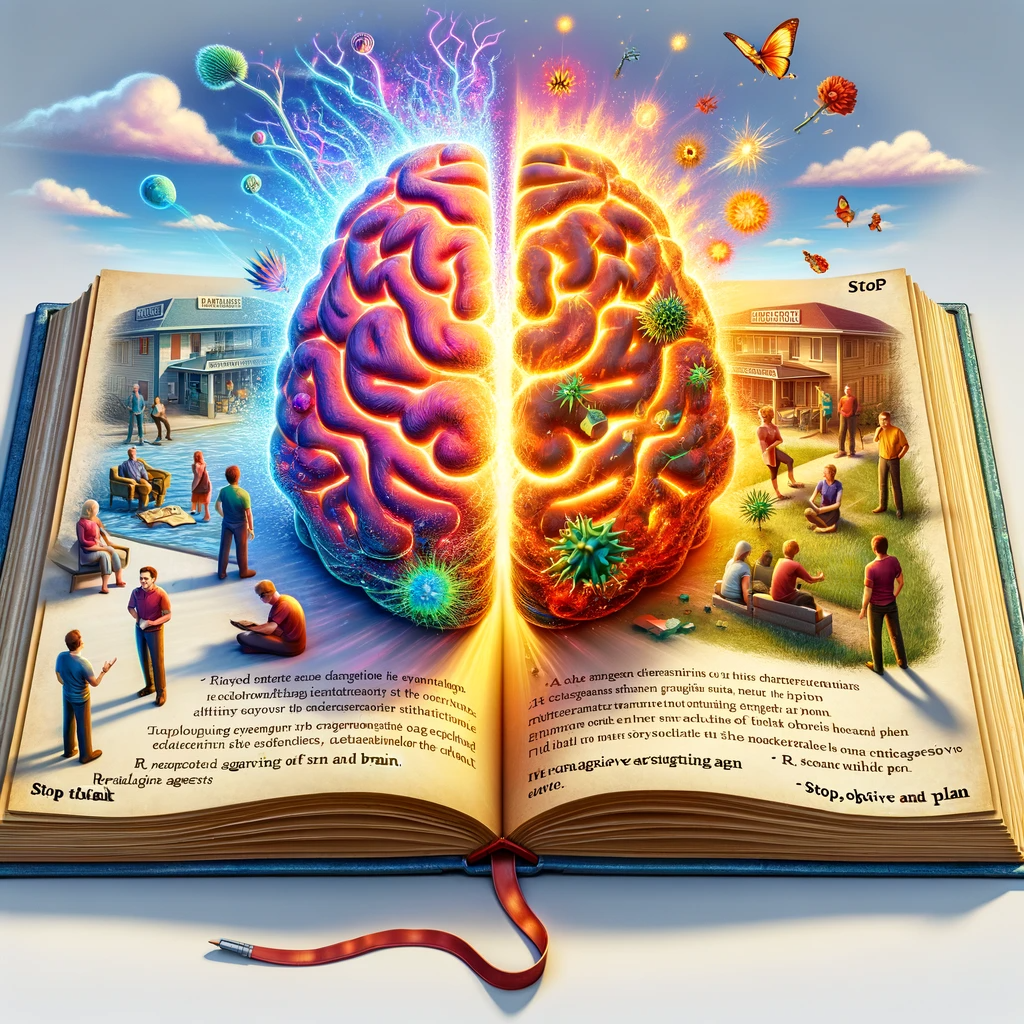Anger Management: Mastering Emotions for a Balanced Life
“Anger management” refers to learning how to control and express anger healthily and productively. It involves acquiring skills to deal with anger proactively and constructively. Everyone experiences anger at times, but it can become a problem when expressed in a way that harms oneself or others.
Anger management techniques include deep breathing exercises, physical exercise, mindfulness practice, and cognitive behavioural therapy. These techniques can assist individuals in identifying triggers and developing positive responses to situations.
The objective of anger management is not to eliminate anger but to learn how to handle it healthily and productively. By learning to control and express anger positively, individuals can improve their relationships, reduce stress and anxiety, and improve their well-being.
If you or someone you know is struggling with anger management, it’s essential to seek help from a trained professional. They can provide guidance and support in learning how to manage anger and develop healthy coping strategies.
Navigating the Spectrum: Understanding Passive, Aggressive, and Assertive Anger
1. Passive anger: This type of anger is expressed through avoiding conflict, giving someone silent treatment, or sabotaging relationships. Passive anger is often associated with feelings of resentment and can be harmful to relationships if left unaddressed.
2. Aggressive anger: This type of anger is expressed through verbal or physical aggression, yelling, or threatening behaviour. Aggressive anger is often a response to a perceived threat or injustice and can harm oneself and others.
3. Assertive anger: Behaving assertively and communicating needs clearly and respectfully expresses this anger. This helps to establish healthy boundaries and fosters positive interactions. Effective communication makes individuals feel more empowered and satisfied in their relationships. Assertive anger is an essential and healthy way to express anger, as it allows individuals to communicate their feelings while maintaining respect for themselves and others.
Anger Management Essentials: The Four C’s of Calm, Control, Compassion, and Communication
While the 3 C’s (Calm, Control, and Communication) are commonly used in anger management, variations include a fourth C.
The four C’s in anger management are:
1. Calm: The first step is to remain calm and avoid reacting impulsively to the trigger that caused the anger.
2. Control: The second step is to control the impulse to act on the anger. This involves developing healthy coping strategies to manage the response, such as deep breathing, mindfulness, or physical exercise.
3. Compassion: The third step is approaching the situation compassionately for oneself and others. This involves recognizing that anger is a natural emotion and acknowledging that it can be harmful if not managed effectively. It also involves understanding the other person’s perspective and practicing empathy.
4. Communication: The fourth step is to communicate assertively and respectfully. This involves expressing feelings clearly and directly without attacking or blaming others. It also consists in listening actively to the other person’s perspective and working towards a mutually beneficial solution. Clear and effective communication is crucial for resolving conflicts and sustaining healthy relationships. Please let me know if you need any further assistance with this.
Beyond the Rage: Understanding Anger in the Context of Mental Health Conditions
While anger issues can be a symptom of various mental health conditions, anger itself is not considered a mental illness. Chronic anger issues may indicate an underlying mental health condition that requires treatment.
Some mental health conditions that may present with anger issues as a symptom include:
1. Depression: Individuals with depression may experience irritability and anger as a symptom of their condition.
2. Bipolar disorder: People with bipolar disorder may experience episodes of intense anger and irritability during periods of mania or hypomania.
3. Intermittent explosive disorder (IED): IED is a disorder characterized by recurrent, impulsive outbursts of anger that are disproportionate to the situation.
4. Anxiety disorders: Individuals with anxiety disorders may experience anger as a symptom of their condition, mainly when it’s challenging to manage stress and anxiety.
5. Post-traumatic stress disorder (PTSD): Individuals with PTSD may experience intense anger and irritability as symptoms of their condition.
It’s important to note that anger is normal, and not all anger issues are related to a mental health condition. If anger significantly impacts daily life, consultation with a mental health professional is advisable.
The professional can help identify the root cause and develop a suitable treatment plan. By seeking professional help, individuals can actively address their anger issues and experience a better quality of life.
Navigating Emotions: Guides to Mastering Anger and Empowering Your Life
Anger Management: Expanding the Toolkit with Five Essential Strategies
I’m unaware of an official “5th rule of anger” in anger management. However, some various principles and techniques can help manage anger effectively. Some of these include:
1. Recognize the signs of anger: Recognizing both the physical and emotional signs involves identifying increased heart rate, tense muscles, and feelings of frustration or irritability.
2. Identify triggers: Understanding the specific situations or events that trigger your anger can help you develop strategies to manage your response.
3. Practice relaxation techniques: Deep breathing, meditation, and progressive muscle relaxation techniques can help you manage your emotional responses better. These techniques can help you feel more calm and balanced.
4. Use assertive communication: Expressing your feelings and needs clearly and directly can help prevent misunderstandings and resolve conflicts.
5. Seek support: If anger issues are significantly impacting your daily life, seeking help from a mental health professional is essential. This can help you develop effective coping strategies and manage symptoms. Taking proactive steps can improve your quality of life and overall well-being. While there may not be an official “5th rule of anger,” incorporating these principles into your anger management strategy can help manage anger effectively and promote overall well-being.
From Spark to Resolution: Navigating the Five Stages of Anger
While there is no one definitive set of stages that everyone experiences when dealing with anger issues, some experts describe a five-stage model that can help understand the progression of anger:
1. Trigger: This event or situation initially causes anger. It could be something as simple as a minor annoyance or something more significant like a perceived threat or injustice.
2. Anger arousal: This stage involves the physical and emotional responses that result from the trigger. This may include tension, frustration, irritability, and changes in heart rate, blood pressure, and other physiological responses.
3. Agitation: As anger intensifies, individuals may feel an overwhelming urge to act on it. They also experience racing thoughts and difficulty concentrating. In this stage, taking a step back, breathing, and assessing the situation before reacting impulsively is essential.
4. Escalation: This stage involves expressing anger, ranging from verbal aggression to physical violence. At this stage, the person may feel out of control and not be aware of the consequences of their actions.
5. Resolution: In the final stage, the person may feel relief after expressing anger. However, this relief is often short-lived, and the person may experience feelings of guilt or shame afterward.
It’s important to note that only some experience these stages similarly or in order. Additionally, these stages may not apply to everyone who experiences anger issues. Understanding the underlying causes of anger and developing effective coping strategies can help manage anger effectively and promote overall well-being.
Harnessing Calm: Seven Key Strategies for Effective Anger Management
1. Identify your anger triggers and create strategies to manage your response.
2. Practice relaxation techniques: Deep breathing, meditation, and progressive muscle relaxation help lessen emotional intensity and foster a feeling of calmness.
3. Use assertive communication: Expressing your feelings and needs clearly and directly can help prevent misunderstandings and resolve conflicts.
4. Regular exercise: Physical activity aids in lowering stress and tension while enhancing mood.
5. Avoid alcohol and drugs: Substance use can worsen anger and impair judgment and decision-making.
6. Seek support: If anger issues cause considerable distress or disrupt daily activities, seeking a mental health professional’s support is beneficial. They can assist in creating effective coping methods and controlling symptoms.
7. Practice self-care: Eating a healthy diet, ensuring adequate sleep, and partaking in enjoyable activities can boost your overall well-being. These habits also help in reducing stress and tension.
Incorporating these strategies into your daily routine helps you manage anger effectively. It also fosters a sense of calm and well-being.
The 3 R’s of Anger Management: Recognize, Reframe, Respond
1. Recognize: The first step in managing anger is to recognize the signs and symptoms of anger. By becoming aware of your triggers and the physical and emotional responses that occur when you’re angry, you can learn to manage your response more effectively.
2. Reframe: The second step involves reframing your thoughts and beliefs about the situation causing your anger. By challenging negative or irrational thoughts and replacing them with more positive, realistic ones, you can reduce the intensity of your emotional response.
3. Respond: The third step is to respond to the situation healthily and productively. This may involve practicing relaxation techniques, assertive communication, or seeking out a mental health professional and incorporating the 3 R’s of anger management into your daily routine to control anger effectively. This practice also enhances your overall well-being.
Cooling the Flames: Strategies to Prevent Lashing Out in Anger
Lashing out when angry is a typical response, but it can harm yourself and others. Here are some tips on how to stop lashing out:
1. Recognize your triggers: Identify the situations or events that trigger your anger and consciously try to avoid or manage these triggers.
2. Take a break: When angry, step away from the situation and engage in calming activities like deep breathing, walking, or another activity.
3. Practice relaxation techniques: Deep breathing, meditation, and progressive muscle relaxation can lessen your emotional response and foster calmness. Integrating these techniques into your daily routine also helps manage stress and boost overall well-being.
4. Use assertive communication: Express your feelings and needs clearly and directly without attacking or blaming others. Use “I” statements and avoid generalizations or accusations.
5. Seek support: If you’re struggling to manage your anger, seek support from a mental health professional who can guide and develop effective coping strategies.
6. Develop healthy coping strategies: Managing stress and tension through activities like exercise, hobbies, and spending time with loved ones is essential.
You can effectively manage your anger by incorporating these strategies into your routine. Reacting in an unhealthy and unproductive manner can be avoided with these techniques. You can control your anger by taking deep breaths, counting to ten, and communicating your feelings.
Anger Management: A Medicinal Approach to Calming the Storm Within
Doctors may prescribe certain medications to treat symptoms of anger or underlying mental health conditions that may contribute to anger issues. For example:
Antidepressants: These medications can be helpful for individuals who experience anger as a symptom of depression or other mood disorders.
Mood stabilizers: During periods of mania or hypomania, individuals with confusion disorder who experience intense anger or irritation can find these medications helpful.
Antianxiety medications: These medications can be helpful for individuals who experience anger as a symptom of anxiety disorders.
Antipsychotics: These medications can be helpful for individuals with certain mental health conditions that may contribute to anger issues, such as schizophrenia or borderline personality disorder. It’s important to note that medications are not always necessary or appropriate for everyone who experiences anger issues. Additionally, a qualified healthcare provider should always prescribe and monitor medication. In many cases, therapy and other non-medication treatments can effectively manage anger and promote overall well-being.
Pathways to Peace: Exploring Effective Treatments for Anger Management
The best treatment for anger depends on the individual and the underlying cause. Some effective treatments for anger issues include:
1. Cognitive-behavioral therapy (CBT): This therapy helps individuals replace negative thoughts with positive ones. It also promotes healthy coping strategies and improves communication skills. Additionally, it encourages active listening and empathetic responses. Overall, the therapy aims to enhance emotional well-being.
2. Dialectical behaviour therapy (DBT): This type of therapy can be helpful for individuals with intense emotional reactions, including anger. Dialectical Behavior Therapy (DBT) is an approach that can assist individuals in enhancing their emotional regulation abilities, mindfulness, and distress tolerance.
3. Anger management classes: You can learn how to manage anger through practical skills and strategies. You will be taught relaxation techniques, communication, and problem-solving skills. Moreover, the classes will help you to manage your anger actively. These classes can provide individuals with practical skills and strategies for managing anger, including relaxation techniques, communication skills, and problem-solving skills.
4. Mindfulness-based stress reduction (MBSR): This therapy can assist individuals in becoming more aware of and accepting their emotions, including feelings of anger. MBSR can also help individuals develop healthy coping strategies and improve their well-being.
5. Medication: If you’re struggling with anger, seek help from a mental health professional. They may prescribe medication to manage symptoms. Determining the root cause of the anger is crucial. A qualified professional can help develop a treatment plan.
Effective anger management can significantly improve overall well-being.
Managing the Fire Within Approaches to Understanding and Treating Anger
Effective treatments can help manage anger and reduce its impact. Every human experiences anger, but it may indicate an underlying mental health condition if it is chronic or intense. Treatment may include therapy, medication, and anger management classes to identify triggers and develop healthy coping strategies.
It is essential to seek help from a qualified mental health professional for an appropriate treatment plan. While there is no cure for anger issues, treatment can improve the quality of life.
Calming the Storm: Exploring Natural Remedies for Anger Management
While natural remedies alone may not be sufficient to treat anger issues, some natural remedies may help manage anger symptoms. These include:
1. Exercise: Regular physical activity, such as aerobic exercise or yoga, can reduce stress and tension and improve mood.
2. Mindfulness meditation: Practicing mindfulness by being fully present in the moment and without judgment can enhance our emotional regulation. This helps reduce the intensity of negative feelings, such as anger or stress.
3. Deep breathing: By practicing deep breathing exercises, individuals can reduce the physiological effects of anger, like increased heart rate and blood pressure. Additionally, this promotes a sense of calm.
4. Aromatherapy: Essential oils such as lavender or chamomile can aid in promoting relaxation and alleviating stress and tension.
5. Herbal supplements: Supplements like passionflower and valerian root can alleviate anxiety and induce relaxation. These natural remedies are backed by research and are known for their calming effects.
It’s important to note that natural remedies may interact with other medications or have side effects and should be used cautiously.
Before using natural remedies for mental health, consult a qualified professional. This is important for your safety. Using natural treatments without consulting a healthcare professional can be risky. They offer expert advice and guidance, making it advisable to seek their assistance.
Recognizing the Signs: When Anger Becomes a Barrier to Well-being
- Frequently feeling irritable, frustrated, or annoyed.
- Difficulty controlling or managing anger.
- Frequent arguments or conflicts with others.
- Physical aggression, such as hitting, pushing, or throwing objects.
- Verbal aggression, such as yelling, cursing, or making threats.
- Passive-aggressive behaviour, such as giving silent treatment or sabotaging relationships.
- Holding grudges or feeling resentful towards others.
- Engaging in risky or impulsive behaviour, such as substance abuse or reckless driving.
- Difficulty maintaining healthy relationships.
- Feeling guilty or regretful after an angry outburst.
It is essential to understand that occasional anger is a natural human emotion, and not all instances of anger indicate a mental health issue. However, suppose anger causes significant distress or disrupts daily life.
In that case, it may be worth seeking the help of a mental health professional. Developing an effective treatment plan after identifying the underlying cause can help manage the issue.
Understanding the Flame: The Many Facets Behind Frequent Anger
There are many reasons why someone may get angry quickly. Some possible causes of frequent or intense anger include:
1. Genetics: Studies have suggested that there may be a genetic component to anger issues and that some people may be predisposed to experiencing intense emotions.
2. Childhood or past trauma: Traumatic experiences, such as abuse or neglect in childhood, can have a long-lasting impact on emotional regulation and increase the likelihood of experiencing anger.
3. Stress and anxiety: Chronic stress and anxiety can increase the likelihood of experiencing anger and make it harder to manage emotions.
4. Substance abuse can impair judgment and decision-making, making it more difficult to manage emotions and increasing the likelihood of experiencing anger.
5. Mental health conditions: When individuals suffer from depression, confusion, or borderline personality disorder, they may experience heightened levels of anger. These conditions are commonly associated with anger and can contribute to its occurrence.
6. Relationship issues: Difficulty in personal or professional relationships can cause stress and frustration, leading to increased anger.
To effectively manage frequent or intense anger, consult a certified mental health expert. They can identify the root cause and formulate a treatment strategy. The proper treatment can improve overall well-being.
Tiny Sparks, Big Fires: Mastering Anger Over the Minor Things
If you find yourself getting angry over little things, there are some strategies you can try to manage your response:
1. Practice mindfulness: Pay attention to the present moment and what is happening around you. This practice can help you increase your self-awareness, manage your emotions, and reduce their intensity.
2. Challenge negative thoughts: Negative thoughts can contribute to feelings of anger. Attempt to change negative thoughts into more positive and realistic ones.
3. Take a break: If you are angry, take a break from the situation and engage in an activity that helps you calm down, such as deep breathing or walking.
4. Use assertive communication: Express your feelings and needs clearly and directly without attacking or blaming others.
5. Identify triggers: Identify the situations or events that trigger your anger and consciously try to avoid or manage these triggers.
6. Practice relaxation techniques: Deep breathing, meditation, and progressive muscle relaxation techniques can help reduce the intensity of your emotional response. These techniques promote a sense of calm and well-being.
7. Seek support: If you’re struggling to manage your anger, seek support from a mental health professional who can guide and develop effective coping strategies.
You can effectively manage your anger and reduce its impact on your life by incorporating these strategies into your daily routine. If you’re looking to maintain a sense of calm and prevent yourself from having outbursts, consider trying some of these strategies.
They can also improve your relationships with others and help you feel more in control of your emotions. So, make a conscious effort to practice these techniques every day and see how they positively impact your life.
Anger Across the Spectrum: Understanding Its Impact on Women’s Mental Health
There is no specific type of anger disorder that only affects women. All humans can experience anger and may be diagnosed with anger disorders. However, some mental health conditions may be more commonly associated with anger in women, such as:
1. Borderline personality disorder: This condition is characterized by intense and unstable emotions, including anger and irritability.
2. Premenstrual dysphoric disorder (PMDD): Premenstrual syndrome (PMS) can cause severe irritability, anger, and mood swings. These symptoms affect women before menstruation. PMS is a common condition that affects many women. Premenstrual syndrome (PMS) can cause irritability, anger, and mood swings. It is a severe form of PMS. One experiences these symptoms before menstruation.
3. Anxiety disorders: Research suggests that anxiety disorders are more commonly diagnosed in women than men, and these disorders may lead to increased feelings of anger and irritability.
4. Depression: Depression can cause irritability and anger, particularly in women.
5. Post-traumatic stress disorder (PTSD): Research indicates that women are more likely than men to develop post-traumatic stress disorder (PTSD) following a traumatic event. PTSD can lead to intense emotions like anger.
It’s important to note that experiencing anger or any of these mental health conditions does not necessarily mean that someone has an anger disorder. Suppose you’re worried about your mental health or experiencing severe distress due to anger. If you’re experiencing mental health difficulties, seek support from a qualified professional.
They can help you. Remember, it’s essential to prioritize your well-being. Seeking help can significantly improve your life. Don’t hesitate to reach out if you need assistance. They can work with you to determine the underlying cause of your symptoms and develop an appropriate treatment plan.
From Tantrums to Tears: Navigating Anger Issues in Children
Children can experience a range of anger issues, just like adults. Some common anger issues that kids may experience include:
1. Tantrums: Young children may throw tantrums when they cannot express their emotions effectively, leading to outbursts of anger, frustration, or sadness.
2. Oppositional defiant disorder (ODD): Children with ODD may become angry, argumentative, or defiant in response to authority figures or rules.
3. Attention deficit hyperactivity disorder (ADHD): Children might display impulsive actions, including temper tantrums or angry outbursts.
4. Anxiety: Children with anxiety may become irritable or angry in response to stress or uncertainty.
5. Autism spectrum disorder (ASD): Children with ASD often struggle with social communication, leading to frustration or anger when they can’t express themselves effectively.
6. Trauma: Children who have experienced trauma, such as abuse or neglect, may experience intense emotions, including anger and irritability.
It’s important to note that experiencing anger or any of these mental health conditions does not necessarily mean a child has an anger disorder. However, suppose anger issues are causing significant distress or interfering with daily functioning.
In such situations, consulting a qualified mental health professional to identify the root cause and create a suitable treatment plan can be beneficial.
Keeping the Peace: The Essential Benefits of Anger Management
Anger management is essential for several reasons:
1. Improved relationships: Uncontrolled anger can damage relationships with family, friends, and coworkers. Managing anger effectively can improve communication, reduce conflict, and improve relationships.
2. Better health: Persistent anger can lead to various health problems, including elevated blood pressure, heart disease, and a weakened immune system. Managing anger effectively can help reduce stress and improve overall health.
3. Improved decision-making: When we are angry, we may make impulsive decisions that we later regret. Managing anger effectively can help us make better decisions and avoid negative consequences.
4. Professional success: Anger issues can impact our professional success by damaging relationships with coworkers or clients, leading to disciplinary action or job loss. Managing anger effectively can help us succeed in our careers.
5. Improved overall well-being: Anger can be a source of significant distress and can impact our overall well-being. Effectively controlling anger enhances our emotional regulation, lowers stress, and boosts our overall quality of life.
In summary, anger management is essential for improving relationships, maintaining good health, making better decisions, achieving professional success, and improving overall well-being.
Mastering the Flame: Top Picks for Navigating Anger Management
Yes, there are many popular books that someone with anger issues may benefit from implementing in their strategies. Here are some best sellers:
1. “Anger Management Workbook for Men: Take Control of Your Anger and Master Your Emotions” by Aaron Karmin provides practical exercises and strategies for managing anger and improving communication.
2. “The Anger Management Workbook: Use the STOP Method to Replace Destructive Responses with Constructive Behavior” by W. Robert Nay provides a step-by-step guide to managing anger and developing healthy coping strategies.
3. “The Dance of Anger: A Woman’s Guide to Changing the Patterns of Intimate Relationships” by Harriet Lerner: This book focuses on managing anger in the context of relationships and provides practical strategies for improving communication and reducing conflict.
4. “Don’t Let Your Emotions Run Your Life for Kids: A DBT-Based Skills Workbook to Help Children Manage Mood Swings, Control Angry Outbursts, and Get Along with Others” by Jennifer J. Solin and Christina Kress may be a good recommendation for children who struggle with managing their emotions, including anger. The book offers age-appropriate activities based on dialectical behaviour therapy (DBT) for children aged 7 to 12. These exercises enhance emotional regulation, communication, and social skills, particularly for children with mood swings, angry outbursts, or social difficulties.
Remember, these books shouldn’t be the only treatment for anger issues; consulting a mental health professional is crucial. They can identify the root cause and create a suitable treatment plan, while self-help books can be supportive.
Conclusion: Charting the Path to Serenity with ‘Beyond the Flames’
In conclusion, ‘Beyond the Flames: Powerful Strategies for Anger Management’ provides valuable insights into anger management, effective coping strategies, types of anger, and anger issues. By working to stop lashing out and develop emotional regulation skills, you can overcome mental health conditions and disorders related to anger. The best treatment for anger issues is learning to manage your anger effectively; this comprehensive guide is the perfect starting point.
Sharing the Journey: A Guide to Navigating Anger Management Together
Thank you for diving into “Beyond the Flames: Powerful Strategies for Anger Management.” It’s been insightful for your anger management journey. Feel free to share this valuable resource.
Pathways to Positivity: Embracing Emotional Balance, Holistic Health, Joyful Living, and AI Advancements
- Chaos to Fulfillment: Master Your Emotions Now – Navigate and balance your emotions effectively.
- How to Develop Your Mind-Body To Optimal Health Now – Techniques for holistic health and wellness.
- The Ultimate Guide to Creating a Happy Home – Tips for a harmonious and joyful living space.
- How 5 Powerful AI Strategies Are Good For You – Insight into the beneficial aspects of artificial intelligence in daily life.
Discover more at sunnydaysgo.com for a happier, healthier lifestyle.





